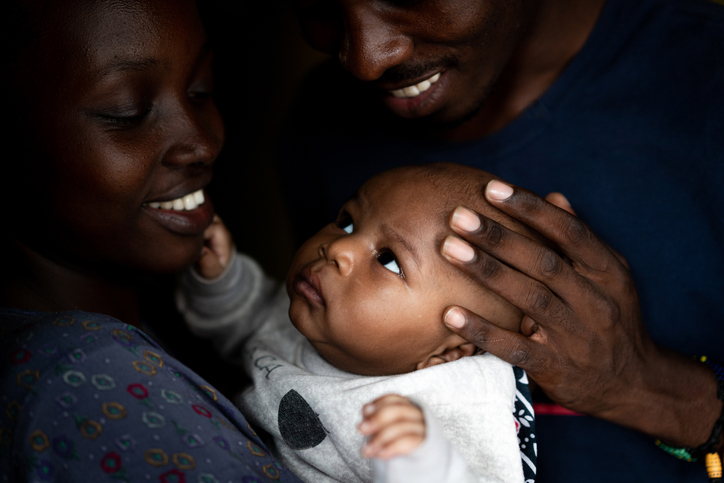Questions To Ask Yourself Before Having Kids With Someone
Share the post
Share this link via
Or copy link

Source: Jasmin Merdan / Getty
This week, during a phone interview with Angela Bassett, I asked her for her best piece of marital advice. Her response was “Marry the right person.” Simple, yet powerful, she emphasized the importance of carefully selecting the person who is best for you before saying “I do” so that you’re not trying to fit a round peg in a square hole after the fact. Her words resonated with me in many ways and also caused me to think about how essential it is to choose the parent of your child with the same intentionality because while marriages can end, parenthood is forever.
It’s not uncommon to hear people complain that their partner or ex-partner changed for the worse after having kids. While this may be true in a handful of cases, what normally happens is that those negative qualities that were once overlooked have now become exacerbated by the fact that they now have to raise a child with this person. Unfortunately, the carefree spirit that rests on the shoulder’s of a relationship before a couple becomes parents can cause them to see each other through rose-colored glasses.
Love MadameNoire? Get more! Join the MadameNoire Newsletter
We care about your data. See our privacy policy.
If you fantasize about spending forever with a person but are wondering if that will change once you have kids with them, ask yourself the following questions.
How do they respond to stress?
The way that a person handles stress is highly important to consider before deciding to have children with them because babies can place a tremendous strain on couples and individuals. While we all cope with stress differently, some people are ticking time bombs under pressure, which can have unhealthy and detrimental effects on children.

Source: Lorado / Getty
How do they treat their other children?
If you want to know what kind of parent your lover will be, take a look at how they treat their other children, if they have them. Are they present? Are they stern? Do they invest in their kids consistently with both time and money? Examining a person’s relationship with their children is like looking into a crystal ball.

Source: FG Trade / Getty
How do they treat their co-parent?
In addition to examining how a person treats their children, consider how they deal with and speak about their children’s other parent? Do they only treat them with hostility and anger? Is your partner one who only has negative things to say about their co-parent? Are they hypercritical of their co-parent without ever stepping in or stepping up to help? Remember that you are only getting one side of the story and there’s an entirely different side of the coin to be considered.

Source: Iconic / Getty
How selfless are they?
How do they react when they have to make sacrifices for others? How willing are they to help a relative or loved one in need? To be a parent means to give endlessly. You don’t want to come to the realization that your partner is selfish after you’ve already produced children with them. Peep game early.

Source: Diversity Photos / Getty
Is there anything of note in their family’s health history?
While not a common conversation, it can also be helpful to discuss your partner’s family health history before deciding to have children. Are there certain cancers or mental illnesses that are common on that side of the family? Are both of you carriers of the sickle cell trait? Having an awareness of their family history as well as your own can help you to make informed decisions regarding the health of your potential children. If you’re unsure where to begin, a genetic counselor can help.

Source: FG Trade / Getty
What is their family dynamic like?
Before having kids with someone, you definitely want to consider the dynamic of that person’s family. Take a good look at their family and ask yourself if you’d want your future child to be permanently connected to them. While no family is perfect, some families’ toxicity and dysfunctionality manifest in ways that are permanently damaging to children.

Source: valentinrussanov / Getty
How aligned are their values with yours?
There are many paths that can be followed when it comes to raising children, but at the end of the day, you’ll want to be raising them with a person whose values align with your own. If not, you will face a tremendous power struggle as you both seek to mold your children in alignment with your dramatically different value systems.

Source: Ivan Pantic / Getty
How do they deal with anger?
Not everyone manages feelings of anger the same. Some people cope with anger by lashing out at their loved ones or even behaving violently. Others become destructive or even go on absorbant spending sprees. All of the above can produce terrible consequences for families and establish unstable environments for children.

Source: Delmaine Donson / Getty
What is their level of self-awareness?
Part of strong parenting is having a reasonable level of self-awareness. An awareness of how you interact with your children and the behaviors that you model in their presence is important. It means recognizing when a particular parenting approach is not working and trying something different. It also means being self-aware enough to realize that you are not perfect and not being too proud to apologize to those kids when you inevitably mess up or lash out.

Source: wera Rodsawang / Getty
How would you rate their work ethic on a scale of 1-10?
Raising kids is hard work. You need to consistently work to make money in order to provide for them financially and there are also heavy amounts of physical and emotional labor involved. Is your partner the lazy type who will likely seek to opt-out of one or all of the above? If so, raising kids with them will be an emotionally overwhelming and frustrating process.



